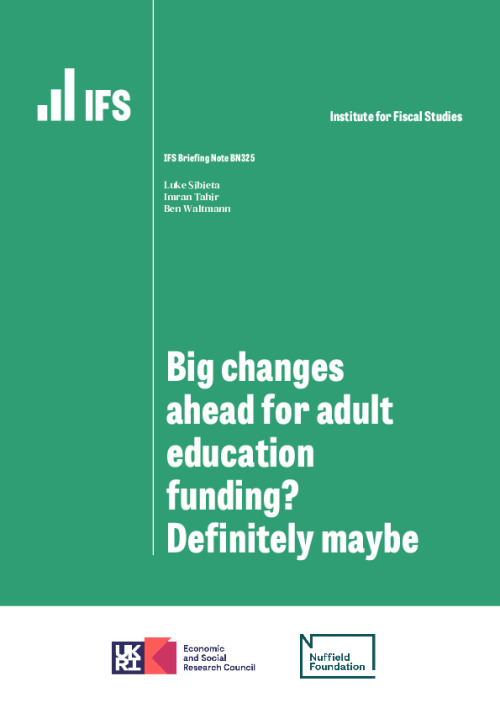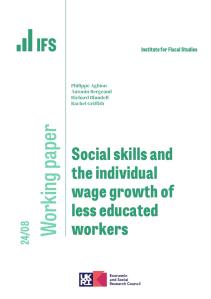The UK is widely recognised to have a significant problem with adult skills. A range of recent government reports and reviews have emphasised the extent of skills shortages, particularly in technical areas, and the lack of responsiveness of the current system to labour market demand. This problem could be exacerbated by any increase in the pace of technological change, such as automation of particular jobs, or negative trade shocks to particular industries. Economic change following on from the pandemic could also lead to a shift in the demand for different types of skills.
Partly motivated by such concerns, the government has repeatedly emphasised a desire to create a post-16 education system in England that provides people with the opportunity to access the training and education they need throughout their life. The Prime Minister has dubbed this the Lifetime Skills Guarantee and announced a £2.5 billion National Skills Fund to deliver this commitment, though, to date, there has been little detail on what either means in practice.
The independent review of post-18 education funding led by Philip Augar, published in 2019, included a series of recommendations on transforming funding for post-18 education and increased funding for adult education in particular (Augar Review, 2019). This included proposals to introduce a lifelong learning loan allowance. This allowance would equalise support for those taking higher and further education courses, and also give learners greater flexibility over their choice of course and institution than the present system allows. The review also proposed restoring public funding for Level 2 (GCSE-equivalent) and Level 3 (A-level equivalent) courses for all adults who do not have qualifications at that level. Along with the introduction of a lifelong learning loan allowance, it also proposed relaxing ‘equivalent and lower qualifications’ (ELQ) rules to allow more people to take further degree- and sub-degree-level courses, even if they have a qualification at the same or a higher level already. There were also a series of recommendations for reforming higher education funding. Nearly two years on from the publication of the review, the government has only published an interim response relating to some limited changes to higher education funding, and has yet to respond to most of the review’s recommendations.
As a result, the DfE’s recent ‘Skills for Jobs’ White Paper (Department for Education, 2021) has been eagerly anticipated as a means for the government to communicate its plan to transform adult education and skills policy, and as a fuller response to the recommendations in the Augar Review.
In this briefing note, we assess the key policy announcements made in the White Paper around the funding of post-18 education. The White Paper itself is broad in scope and includes discussions of many potential areas of reform.
Key findings
- The government has sought to make reforming adult education and skills policy a key priority. The Department for Education has recently published a White Paper to communicate the government’s strategy. This comes on the back of a large drop in the number of adult learners and a 50% fall in spending since 2010.
- One element of this strategy is the National Skills Fund. This seems to equate to a commitment to spend an extra £2.5 billion on adult skills over the parliament, or about £625 million extra per year for four years (although it is difficult to be certain due to a distinct lack of detail). This spending commitment will only reverse about one-third of the cuts to adult education spending over the 2010s.
- As of April 2021, the government has restored the entitlement to free A-level-equivalent or Level 3 courses for adults without qualifications at this level. However, it only applies to courses in ‘high priority’ areas, which excludes courses in areas such as hospitality, tourism and media.
- The White Paper suggests changing the adult education funding system, but only commits to a consultation. There would certainly be merit in reforming the system though, given its complexity, short-term focus and perverse incentives just to get numbers up.
- A key policy initiative the White Paper introduces is the Lifelong Loan Entitlement, which aims to give everyone access to funding for the equivalent of four years of post-18 education and remove arbitrary distinctions between further education and higher education courses.
- While the policy seems like a sensible proposal, there are a number of important details left to be worked out. Courses classed as ‘approved higher technical qualifications’ will be eligible for extra funding, but it is not clear how this will be determined and what will happen to other courses. This will have a substantial bearing on the effects and cost.
- Despite extensive consultation as part of the Augar Review, the government has only committed to consult further on whether to relax equivalent or lower qualification (ELQ) funding rules. Relaxing such rules would enable more adults to retrain at qualification levels they have already attained, but does come with risks.












